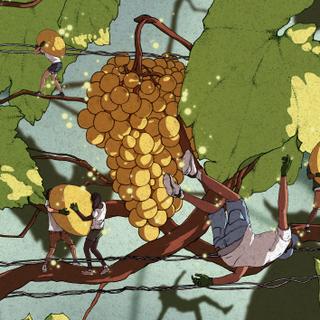


'We're not slaves': Champagne's seasonal harvesters face abuse
InvestigationIn the Champagne region, 120,000 seasonal workers are employed each year to harvest the grapes that make the famous sparkling wine. But several court cases are forcing champagne houses to reconsider their working and accommodation conditions.
It has been a sad year in the vineyards of Champagne. A woman and three men died in September while taking part in the grape harvest. One man was Polish, the other three French. The youngest was 19, the others between 40 and 50. One collapsed while picking black grapes, another fainted and fell from a machine, and a third was found dead at home, having collapsed in the vineyards earlier. All died from cardiac arrests, seemingly, and all endured extreme temperatures above 40°C for hours on end. The courts will have to determine the precise causes of their deaths, whether there was any negligence, and who can be held responsible. For criminal proceedings to commence, a clear link will have to be established between the deaths and a failure to comply with regulations.
The problem for the champagne sector is that these investigations come on top of a number of other discomfiting cases. In September, investigations were opened by the Châlons-en-Champagne prosecutor's office into "human trafficking," this time regarding the working conditions and remuneration of around 100 foreign and undocumented grape pickers from West Africa and Eastern Europe. Elsewhere, accommodation facilities have come under fire. Four have been deemed unsanitary and were administratively closed since the beginning of this year.
These cases shed light on a little-known side of champagne: the world of seasonal workers employed during the harvest period. Every year, 120,000 people work in the region over a period of three to four weeks. Why are these numbers so much higher than in other wine-growing regions? Simply because the regulations in the Champagne region require all grapes to be cut by hand, not by machine.
A worrying situation
In view of the large number of seasonal workers employed, the number of tragedies and incidents reported may seem small. That is the argument put forward by David Chatillon, the president of the Union of Champagne Houses (UMC), the organization regrouping the most prestigious brands. Without minimizing the seriousness of the incidents – "We're shocked and stunned. This must never happen again" – Chatillon stressed the "very marginal nature" of these problematic cases. The argument was repeated by the Syndicat Général des Vignerons winegrowers' union.
Still, the situation has become sufficiently worrying for the Interprofessional Champagne Wine Committee (CIVC), the industry's umbrella organization, to sound the alarm in late September: "It's vital that the excesses and unacceptable behavior stop. The safety and protection of grape pickers must become an absolute priority."
You have 90% of this article left to read. The rest is for subscribers only.
